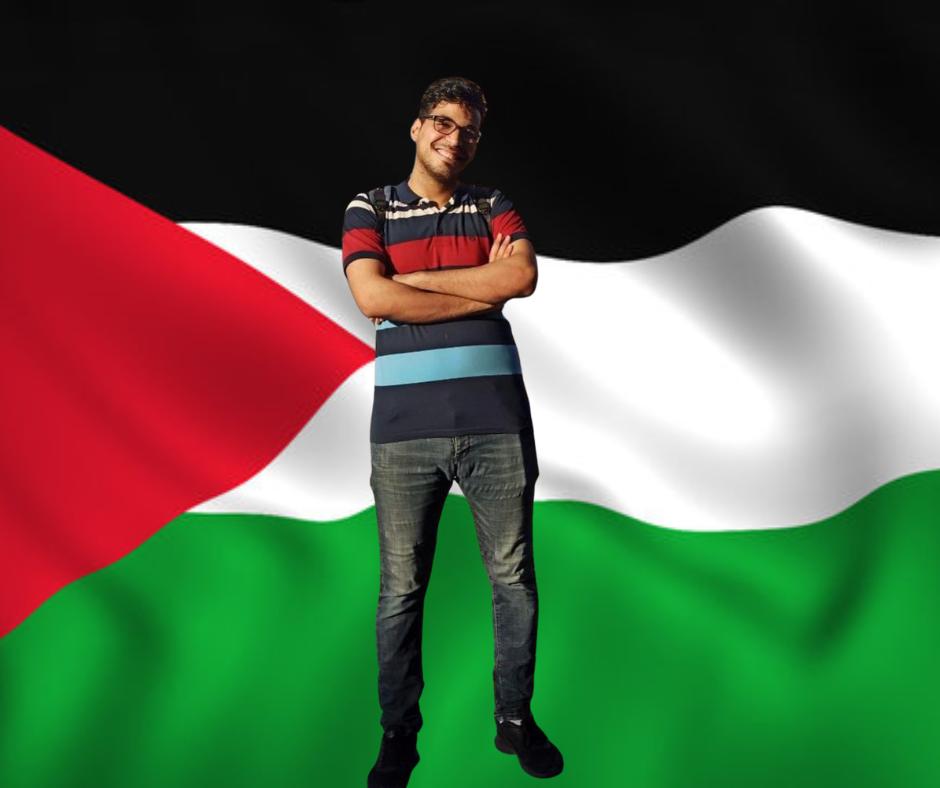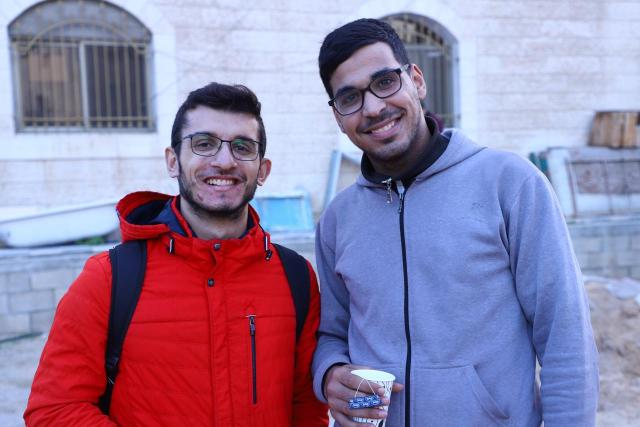 We Are Not Numbers regretfully announces that we have lost another member of our family. An Israeli airstrike killed Mohammed Zaher Hamo and his father and brothers shortly before the ceasefire which began Nov. 25.
We Are Not Numbers regretfully announces that we have lost another member of our family. An Israeli airstrike killed Mohammed Zaher Hamo and his father and brothers shortly before the ceasefire which began Nov. 25.
May Mohammed and his deceased family members rest in peace.
Mohammed joined We Are Not Numbers in 2023. He was an English literature and translation student at the Islamic University of Gaza. He was passionate about football and particularly the LaLiga sports association. He was known for his amazing smile and comic genius that could always get everyone laughing out of control.
He will also be remembered for his kindness. “I want to help the oppressed people worldwide who are enduring several kinds of injustice in different parts of the world,” Mohammed said in his biographical statement. “I aspire to shed light on their suffering, raise global attention, and seek support for their cause. I am driven by a strong desire to make a difference and work towards creating an equitable world for all.”
His ambition was to pursue a master’s degree in journalism. A story he published at We Are Not Numbers, “When drama joy becomes a fight for survival,” described how and his family were gathered together to watch a recording of a dramatic comedy he wrote and performed in, when they were interrupted by an Israeli airstrike nearby. That occurred in May 2023. The story was co-published with Palestine Deep Dive. Mohammed’s byline also appeared on the article, Gaza photographer captured and tortured by Israel, published by Electronic Intifada.
We are adding tributes to Mohammed as they are able to come in, given the challenging communication circumstances.
Enas Fares Ghannam
Mohammed! One of the main reasons for why Mohammad was accepted in We Are Not Numbers was his smile and how optimistic he was. May he and his family rest in peace. (Statement originally published on Instagram)
Roaa Missmeh
One of my best friends in WANN has been killed. Mohammed Zaher Hammo. He always had a smile on his face. Always willing to help me with ideas and publishing. He always used to say that in a parallel world, he and I are twins. He was like a leader to us. I can’t stop thinking about him. The truce came, and all the bad news came. He was killed before publishing a book, before going to London, as he always wanted, and before all his dreams came true. I hope he is in a better place.
Khaled El-Hissy

I was taking these pictures and telling you, “These are for the memory.” We would be happy. All that we thought about at the time was that these pictures would be beautiful memories when we look at them one day. But it never crossed my mind that your pictures, dear Mohammed, would make me cry. If I ever knew that you would be martyred and leave us, I would never have taken so many pictures and videos for you. Where are you, Mohammed, so we can look at our pictures together as we always did?
We used to spend so much time at the university library to study. I would show you our pictures, and you would always laugh your roaring laughter. They’ve stolen you from us. They’ve stolen your laughter. They’ve stolen our university. These videos and pictures will be immortalized forever. And your impact, my dear Mohammed, will remain within us until the last breath.
Laura Albast
I knew Mohammed briefly. I was matched to mentor him mere days before the war. He became my friend. He joked with me, sent me clips of his grandfather’s garden, of him and his baby cousin eating bread and drawing, of his now-destroyed university where he told me he spent most days writing. He was so excited to begin his story, which would have been published for WANN. Mohammed sent me screenshots of a Word document on his laptop, where he had written about Filfil and the wars he’s experienced growing up. I don’t know who Filfil was — a toy, a pet? Nor do I know what horror Mohammed experienced when he was nine years old, 10 years ago. I was waiting for him to tell me, to write his story. But now, all I’ll have is glimpses of his life, and broken messages of his last days in Gaza.
Irene Doukas Behrman
So many things about Mohammed will be impossible to forget, starting with his contagious smile. He radiated kindness, generosity, wit, and wisdom, and was hysterically funny. I worked with him on his story for WANN and then on another piece for a different publication, which he asked that I look over as it was also in English. Following our first video chat, he admitted he’d been a bit nervous as it was his first time ever speaking to a native English speaker. I was so surprised, as his English skills were quite good. He continued to surprise me throughout our friendship—more and more every time we spoke, actually—with his distinctive blend of humor and bravery.
He told me in October that he and his family had decided to stay put despite the very real risk of death, because, in his words, “If we die, we will die in our home on our land, so it can stand as a witness on the Israeli crimes against the civilians and unarmed people of Gaza.” He said he did not want to sleep on the streets in Gaza’s south. Later that month, he gently pressed me on the photos I sent of a march in Boston: “This is a great job! But we need more! I mean we need such [a] protest in front of the White House and such governmental buildings.” He was right, and he was one of the reasons why I booked a bus ticket to travel from Boston to Washington, D.C. in November to protest at the White House.
Mohammed’s Internet connection was in and out, but as recently as the 14th, he asked if he could share a song he was listening to with me. Of course I said yes. He then quipped that once I heard the song, I would block him on WhatsApp. Ever the joker, the “song” Mohammed sent was a short recording he’d made of the hideous sound of Israeli drones up above. He even teased me about my messy computer desktop, which we laughed about together.
After his family lost their home in an airstrike, Mohammed was also brave enough to request that I do some fundraising for them, which he confessed was an extremely difficult ask because it made him feel like “a beggar.” I sent him screenshots of donations flooding in from many of my friends in the United States, and told him that they were his friends too. I wanted him to know he was cared for, and I do believe he felt our care. One of the last things he wrote to me—after he had lost his home, his university, his room, his bed, his computer, and many family members under rubble—was, “I consider myself the luckiest person in this life to have such friends.”
Mohammed was always thanking me for speaking up about Palestine. As unbelievable as it sounds, I believe that he felt indebted to me—a ridiculous notion that I tried to talk him out of numerous times. One of my greatest regrets is failing to convince him that he owed the world nothing, and that we owed him everything. To borrow his words, I consider myself the luckiest person in this life to have had a friend like Mohammed. Rest in peace, my powerful friend. I am forever indebted to you.
See also the separate tribute by Mahmoud Alyazi, I miss you, my brother.









